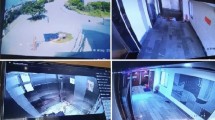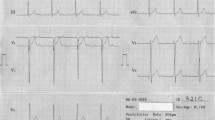Abstract
An 11-year-old boy with familial dysautonomia presented with palpitations. Continuous 24-h Holter monitoring revealed intermittent high-grade atrioventricular block and asystole. The unopposed parasympathetic tone in patients with dysautonomia may make them susceptible to bradycardia and atrioventricular block. We recommend routine 24-h Holter monitoring screening and, when indicated, consideration of pacemaker implantation to reduce the high risk of sudden death phenomena in this patient population.


Similar content being viewed by others
References
Axelrod FB (2004) Familial dysautonomia. Muscle Nerve 29:352–363
Axelrod FB, Goldberg JD, Ye XY, Maayan CH (2002) Survival in familial dysautonomia:impact of early intervention. J Pediatr 141:518–523
Axelrod FB, Putman D, Berlin D, Rutkowski M (1977) Electrocardiographic measures and heart rate variability in patients with familial dysautonomia. Cardiology 88:133–140
Bartoletti A (2005) Cardiac pacing in patients with familial dysautonomia—there is nothing simple about sudden death. Clin Auton Res 15:6–9
Glickstein JS, Axelrod FB, Friedman D (1999) Electrocardiographic abnormalities in familial dysautonomia: an indicator of cardiac autonomic dysfunction. Clin Auton Res 9:109–112
Glickstein JS, Schwartzman D, Friedman D, Rutkowski M, Axelrod FB (1993) Abnormalities of the corrected QT interval in familial dysautonomia: an indicator of autonomic dysfunction. J Pediatr 122:925–928
Gold-Von Simson G, Rutkowski M, Berlin D, Axelrod FB (2005) Pacemakers in patients with familial dysautonomia—a review of experience with 20 patients. Clin Auton Res 15:15–20
Hillz MJ, Kolodny E, Neuner E, Stemper B, Axelrod FB (1998) Highly abnormal thermotests in familial dysautonomia suggest increased cardiac autonomic risk. J Neurol Neurosurg Psychiatry 65:338–343
Michaelsson M, Jonzon A, Riesenfeld T (1995) Isolated congenital complete atrioventricular block in adult life: a prospective study. Circulation 92:442–449
Rutkowski M, Axelrod FB, Danilowitcz D (1992) Transient third-degree atrioventricular block in a 4-year old child with familial dysautonomia. Pediatr Cardiol 13:184–186
Ziegler MG, Lake CR, Kopin IJ (1976) Deficient sympathetic nervous response in familial dysautonomia. N Engl J Med 294:630–634
ACC/AHA/NASPE (2002) 2002 guideline update for implantation of cardiac pacemakers and antiarrhythmia devices:summary article: a report of the American College of Cardiology/American Heart Association Task Force on Practice Guidelines (ACC/AHA/NASPE Committee to Update the 1998 Pacemaker Guidelines). Circulation 106:2145–2161
Acknowledgment
Amichay Rotstein, M.D., was supported by a fellowship grant from the Medical Research Institute Council (MRIC), Children’s Memorial Hospital, Chicago, Illinois.
Author information
Authors and Affiliations
Corresponding author
Rights and permissions
About this article
Cite this article
Rotstein, A., Charrow, J. & Deal, B.J. Documented Transient Third-Degree Atrioventricular Block and Asystole in a Child with Familial Dysautonomia. Pediatr Cardiol 29, 202–204 (2008). https://doi.org/10.1007/s00246-007-9057-3
Received:
Revised:
Accepted:
Published:
Issue Date:
DOI: https://doi.org/10.1007/s00246-007-9057-3




